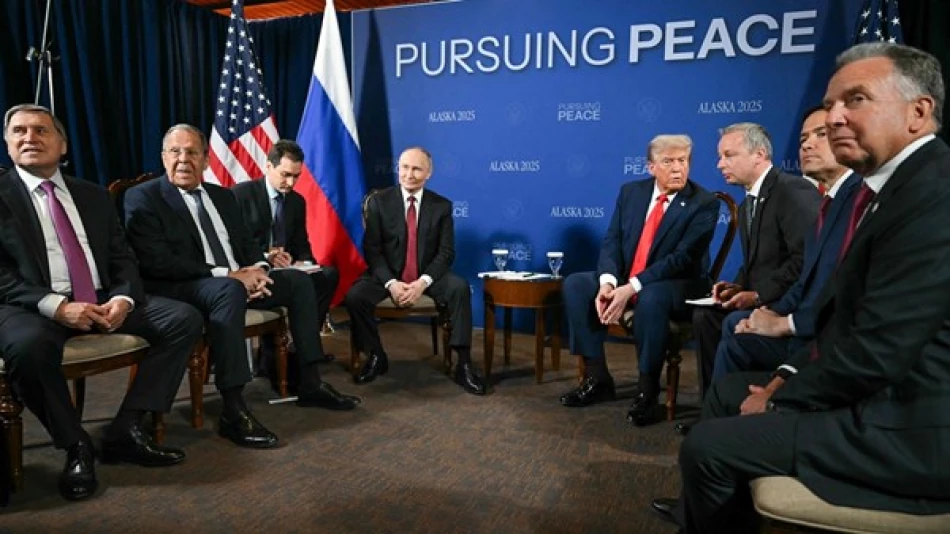
Trump-Putin Summit: Ivekov Reveals Insights into Outcomes
Trump-Putin Alaska Summit Yields Breakthrough on Ukraine Security Guarantees
A high-stakes diplomatic meeting between President Donald Trump and Russian President Vladimir Putin in Alaska has produced what may be the most significant progress toward ending the Ukraine conflict since it began. US Special Envoy Steve Witkoff revealed that the leaders agreed on "robust security guarantees" for Ukraine and that Russia has made concessions regarding five Ukrainian territories it previously claimed to annex.
Game-Changing Security Framework Emerges
Speaking to CNN on Sunday, Witkoff described the security guarantees as "equation-changing," suggesting a fundamental shift in how Ukraine's sovereignty would be protected in any peace agreement. While specific details remain classified, such guarantees typically involve international monitoring mechanisms, military assistance commitments, or multilateral defense partnerships.
This approach mirrors successful post-conflict arrangements like the Dayton Accords that ended the Bosnian War, where robust international oversight and security provisions created lasting stability. The emphasis on "robust" guarantees suggests the US and Russia may have found common ground on enforcement mechanisms that both sides can accept.
Russian Territorial Concessions Signal Flexibility
Perhaps more surprising is Witkoff's revelation that Russia has shown flexibility on the five Ukrainian regions it claims: Donetsk, Luhansk, Kherson, Zaporizhzhia, and Crimea. The inclusion of Crimea—annexed by Russia in 2014 and considered by Moscow as permanently integrated—indicates Putin may be willing to negotiate on territories previously deemed non-negotiable.
Strategic Calculation Behind Putin's Shift
Russia's apparent willingness to discuss territorial concessions likely reflects several converging pressures. Economic sanctions have strained Moscow's resources, while military costs continue mounting. Putin may view negotiating from a position of controlling significant Ukrainian territory as preferable to prolonged conflict with uncertain outcomes.
The timing also suggests Putin recognizes Trump's transactional approach to foreign policy, potentially seeing an opportunity to secure favorable terms before European allies can influence the process.
Monday's Multilateral Summit: The Real Test
The true measure of progress will come Monday when Trump meets with Ukrainian President Volodymyr Zelensky and European leaders. Witkoff's optimism about achieving "actual consensus" indicates preliminary agreements may already be in place, but Ukraine's acceptance remains crucial.
European participation is particularly significant, as any sustainable peace agreement will require EU economic support for reconstruction and long-term security commitments. The inclusion of European leaders suggests Trump recognizes that unilateral US-Russia agreements cannot succeed without broader Western backing.
Market and Geopolitical Implications
Energy markets are already responding to peace prospects, with natural gas futures declining on expectations that Russian supplies might normalize. European industries, particularly in Germany, stand to benefit significantly from reduced energy costs and supply chain stability.
For Ukraine, robust security guarantees could unlock massive reconstruction investment currently held back by conflict uncertainty. International financial institutions have prepared multi-billion dollar aid packages contingent on sustainable peace agreements.
Historical Precedent Suggests Cautious Optimism
While diplomatic breakthroughs often precede successful peace agreements, implementation remains the critical challenge. The 2015 Minsk Accords demonstrated how initial progress can stall without proper enforcement mechanisms and genuine commitment from all parties.
However, the direct involvement of both US and Russian presidents, combined with specific territorial concessions and security framework discussions, suggests more substantive progress than previous diplomatic efforts achieved. The key difference may be Trump's willingness to offer Russia face-saving compromises while maintaining Ukraine's core territorial integrity through international guarantees.
Most Viewed News

 Layla Al Mansoori
Layla Al Mansoori






